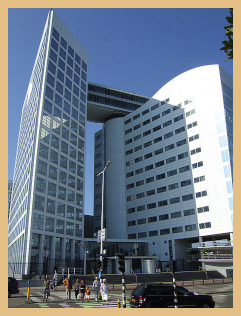
On March 8-9, 2012, The International Criminal Court Student Network will convene a conference on the ICC's first case: The case of Thomas Lubanga Dyilo.
This conference offers undergraduate, graduate and law students, and early professionals/academics (generally within five years of terminal degree) studying or working in the field of International Criminal Law an opportunity to both present and discuss their research. Invited speakers will be asked to prepare comments or a paper. A number of papers will be selected for publication in the ICCSN's journal, Issues in International Criminal Justice. If you are interested in presenting at the conference, please click on the "proposal submissions" tab above for guidelines.
This conference offers undergraduate, graduate and law students, and early professionals/academics (generally within five years of terminal degree) studying or working in the field of International Criminal Law an opportunity to both present and discuss their research. Invited speakers will be asked to prepare comments or a paper. A number of papers will be selected for publication in the ICCSN's journal, Issues in International Criminal Justice. If you are interested in presenting at the conference, please click on the "proposal submissions" tab above for guidelines.
Registration costs are $50.00 US per person. Register online here. Registration for participants not presenting a paper is open, and the regular fee applies regardless of whether one is presenting a paper.
The case of Thomas Lubanga Dyilo is the first case of the International Criminal Court (ICC). The trial opened on January 26, 2009, and ended on August 26, 2011. The judges are now deliberating and will render their decision "within a reasonable amount of time." This case is historic because it the first time that the Rome Statute, the treaty by which the ICC is governed, has been interpreted.
The Lubanga case has presented a number of challenges for the court which arise from the need to balance the rights of the accused against the rights of victims, witnesses and intermediaries. Lubanga raised a number of difficult questions, including:
Thomas Lubanga Dyilo is accused of committing the war crimes of enlisting and conscripting of children under the age of 15 years into the Forces patriotiques pour la libération du Congo [Patriotic Forces for the Liberation of Congo] (FPLC) and using them to participate actively in hostilities in the context of an international armed conflict from early September 2002 to 2 June 2003 and in the context of an armed conflict not of an international character from 2 June 2003 to 13 August 2003. The trial started on 26 January 2009. The Prosecution finished its presentation on 14 July 2009. The trial proceedings ended on August 26, 2011. The judges are now deliberating and will render their decision "within a reasonable amount of time."
The Lubanga case has presented a number of challenges for the court which arise from the need to balance the rights of the accused against the rights of victims, witnesses and intermediaries. Lubanga raised a number of difficult questions, including:
- 1) How to reconcile the conflict between two conflicting Prosecutorial duties: the duty to disclose exculpatory evidence, on the one hand, and the duty to protect the confidentiality of intermediaries, witnesses and information sources, on the other. (In July 2010, judges halted Lubanga's trial and ordered his release after ruling that a fair trial was no longer possible because the prosecution was refusing to hand over information to the defense. Ultimately, the court decided to lift the stay and the trial proceeded).
- 2) How to serve justice to victims of crimes that are not identified in the formal charges, despite evidence of their occurrence
- 3) How to determine the precise nature of "victim participation" and how to distinguish victims from non-victims.
Thomas Lubanga Dyilo is accused of committing the war crimes of enlisting and conscripting of children under the age of 15 years into the Forces patriotiques pour la libération du Congo [Patriotic Forces for the Liberation of Congo] (FPLC) and using them to participate actively in hostilities in the context of an international armed conflict from early September 2002 to 2 June 2003 and in the context of an armed conflict not of an international character from 2 June 2003 to 13 August 2003. The trial started on 26 January 2009. The Prosecution finished its presentation on 14 July 2009. The trial proceedings ended on August 26, 2011. The judges are now deliberating and will render their decision "within a reasonable amount of time."